The 1st Belt and Road Conference on Science and Technology Exchange co-sponsored by the Ministry of Science and Technology, Chinese Academy of Sciences, Chinese Academy of Engineering, China Association for Science and Technology, Chongqing Municipal People's Government and the People's Government of Sichuan Province will be held in Chongqing from November 6 to 7.
As a "Double-First-Rate" university which sticks to taking root in Bayu area for university running and always takes a pioneering attitude for integrating into the overall situation of national and regional development, Chongqing University will also practice its missions at this Conference, writing a new chapter on the "Silk Road Development Blueprint" and continuing to make its "significant" achievements.
Take the lead in discussing the paradigm shift in research and development in the digital era
On the morning of November 7, as one of the important activities of the 1st Belt and Road Conference on Science and Technology Exchange, the "Presidents Roundtable Forum: Paradigm Shift in Research and Development in the Digital Era" undertaken by Chongqing University will be held in Chongqing Yuelai International Convention Center. Presidents from universities in the countries involved in the Belt and Road Initiative, such as Belarus, South Africa, Brunei, Malaysia and Morocco, as well as domestic universities such as University of Hong Kong, Harbin Institute of Technology, Dalian University of Technology and Beijing Institute of Technology will gather for the "summit dialogues".
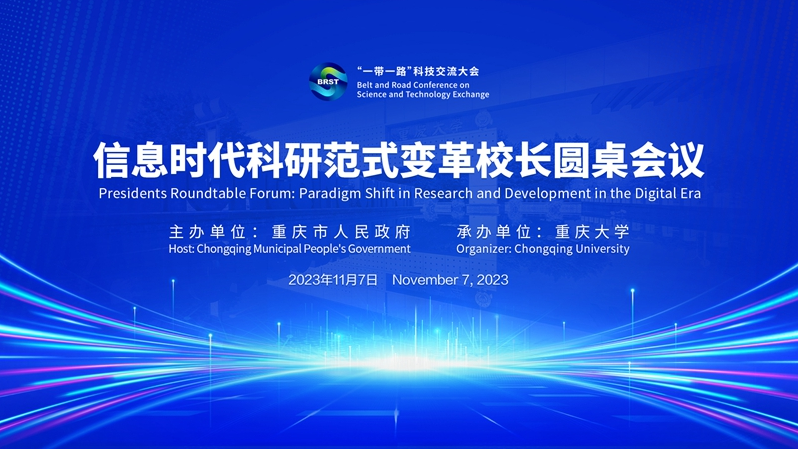
In the new round of scientific and technological revolution and industrial transformation, subversive technology, prospective technology and leading technology are constantly emerging, and global scientific and technological innovation has entered an unprecedented period of intensive activity, in which scientific and technological innovation has become the core driving force leading social development and scientific research has stepped into the data-intensive fourth paradigm. Centered around how to shift the paradigm of scientific research and development, transform the way of scientific research and development thinking and behavior organization, and promote universities to break the boundaries of disciplines and realize the cross-integration of traditional disciplines and information disciplines, basic disciplines and emerging disciplines under the conditions of the digital era, the guests will discuss the new ideas and new paths of the iUNRC member universities in scientific and technological innovation cooperation in these two roundtables themed on "Artificial Intelligence Drives Paradigm Shift in Research and Development" and "International Exchange and Cooperation in New Paradigm of Research and Development".
Found the University Network for Research Collaboration: A Belt and Road Science and Technology Initiative (iUNRC)
On the afternoon of November 7, Chongqing University will initiate the founding of the University Network for Research Collaboration: A Belt and Road Science and Technology Initiative (iUNRC), in order to further implement the results of the Belt and Road Conference on Science and Technology Exchange and the Presidents Roundtable Forum: Paradigm Shift in Research and Development in the Digital Era.
Being the deep combination of science and technology as the first productive force, talent as the first resource and innovation as the first driving force, higher education shoulders the great responsibility and mission of building a socialist modern country in an all-round way and promoting the great rejuvenation of the Chinese nation in all respects. Chongqing University has always adhered to its mission to "study academics, nurture talents, rejuvenate the state and guide the society", taken on the duty of "national team" and given priority to serving the major national strategies and local development in school work.
As the new era comes, based on the new development stage, Chongqing University implements the new development concept and serves to build a new development pattern. Focusing on the "four orientations", it continuously deepens the paradigm shift in research and development, makes great efforts to promote organized and systematic scientific research breakthroughs, speeds up the construction of ultra-transient experimental scientific facility, builds the high-quality Chongqing University Science Center, actively gets all kinds of high-quality innovative resources and gathers strength to build a strategic scientific and technological force that serves the independent development of high-level science and technology. Through this University Network for Research Collaboration: A Belt and Road Science and Technology Initiative (iUNRC), a "Belt and Road" normalized science and technology exchange mechanism will be built and a wider range of science and technology resources from the global universities will be gathered to serve the needs of "Belt and Road" science and technology innovation and cooperation.
"CQU's significant" achievements in building the "Belt and Road" over the past ten years
In the past decade, Chongqing University has fully implemented the educational cooperation with countries involved in the "Belt and Road Initiative", vigorously promoted talent training, and actively expanded foreign cooperation and exchanges. It constantly promotes international collaborative innovation, speeds up the process of internationalization in running school, expands the breadth and depth of internationalization, builds a platform for international cooperation and exchanges, and further establishes a bridge between Chongqing and the countries involved in the "Belt and Road Initiative".
Educational exchanges and interconnection is promoted based on research cooperation. Supported by the advantageous disciplines, Chongqing University takes the lead in establishing and continuously promoting the "Joint Laboratory for International Cooperation in Green Building and Residential Environment Construction" and "Joint Laboratory for International Cooperation in Light Alloy Materials" and jointly building "Technical Cooperation Platform of Chongqing University-Korea Electronics Technology Institute" to construct an industry-university-research collaborative innovation cooperation mechanism and keep smooth educational cooperation.
Sharing of educational achievements is advanced with talent training as the support. Chongqing University adheres to attaching equal importance to recruit international students for study in China and send domestic students abroad for overseas study and implements the International Study Plan of the "Silk Road" Education Action. Every year, it sets up special funds for inter-school exchanges, focusing on subsidizing students from the countries participating in the "Belt and Road Initiative" to study at its campuses. At present, it has established sound cooperative relations with 40 top universities in 13 countries and domestic first-class universities involved in the "Belt and Road Initiative" and made great efforts to promote the cooperation and sharing of academic achievements.
High-end projects of supporting foreign experts to conduct scientific research in China are actively implemented and the transformation of introduced intellectual achievements is promoted. In the past three years, Chongqing University has invited 23 foreign experts from Spain, Serbia, Argentina, Iran, Russia, Singapore, Turkey, Malaysia and Poland and other countries participating in the Belt and Road Initiative to carry out cooperative research, which has deepened the scientific and technological innovation cooperation with the universities in these participating countries.
"CQUers" making contributions to the "Belt and Road" over the past ten years
"The deepening of the 'Belt and Road' education cooperation will be written into the First-class University Construction Program and the Chongqing University's 14th Five-Year Plan for Internationalization as the key tasks of the "Double-First-Rate" construction and the "14th Five-Year Plan." This is a clear banner that Chongqing University sets when taking serving the national strategy and local development as its own responsibility. In the past ten years, "CQUers" have made great achievements on the "Silk Road Development Blueprint" by "outstanding abilities".
In Singapore, Prof. Yang Bo from the School of Civil Engineering, Chongqing University, together with JTC Corporation (a governmental agency in Singapore), Singapore Institute of Technology (SIT), WOH HUP Construction Company of Singapore and TTJ Design And Engineering (a structural steel manufacturer in Singapore), conducted in-depth research on carbon emissions of industrial and commercial buildings, and developed a high-performance precast steel-concrete composite beam (HPCB) system. According to reports, compared with the traditional reinforced concrete composite beam, the results of this system can reduce carbon emissions by more than 25% and save the total cost by more than 10%. For overloaded or long-span structures, the pre-designed HPCB can maximize its advantages.
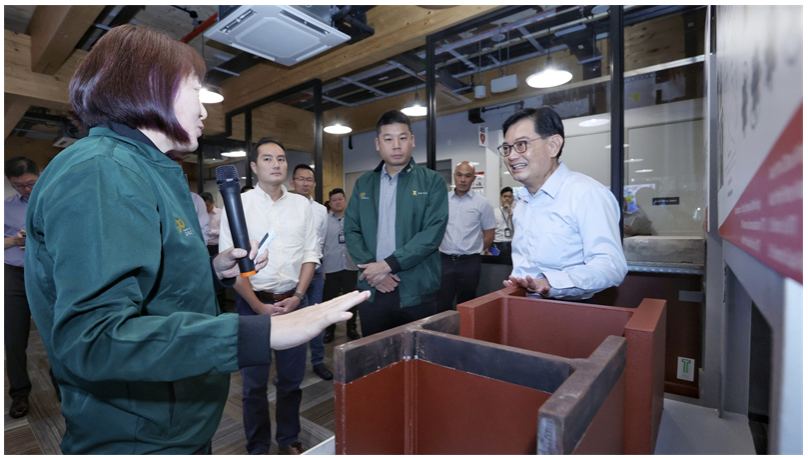
Heng Swee Keat, Deputy Prime Minister of Singapore, visited the system display.
In Vietnam, the scientific research achievements of Chongqing University can be seen from offshore wind power cluster to longitudinal line of land light rail. On November 6, 2021, the first urban light rail project in Vietnam, the "Tuyến Cát Linh-Hà Đông" light rail in Hanoi, Vietnam, was officially handed over and put into operation, marking a major breakthrough in the "going out" principle of the complete set of China urban light rail. The PCC pile technology, a patented soft foundation reinforcement technology independently developed by Pro. Liu Hanlong of Chongqing University, was applied to the early construction of the project through international technical authorization. From June 2021 to May 2022, the School of Civil Engineering of Chongqing University and PowerChina Jiangxi Electric Power Engineering Co., Ltd. put forward a refined and efficient design method for high-rise platform pile foundation structure of offshore wind turbine based on the local industrial development and marine, hydrological and geological conditions in Ca Mau, Vietnam, and applied it to the offshore wind farm in Ca Mau, Vietnam (a total of more than 40 turbines).
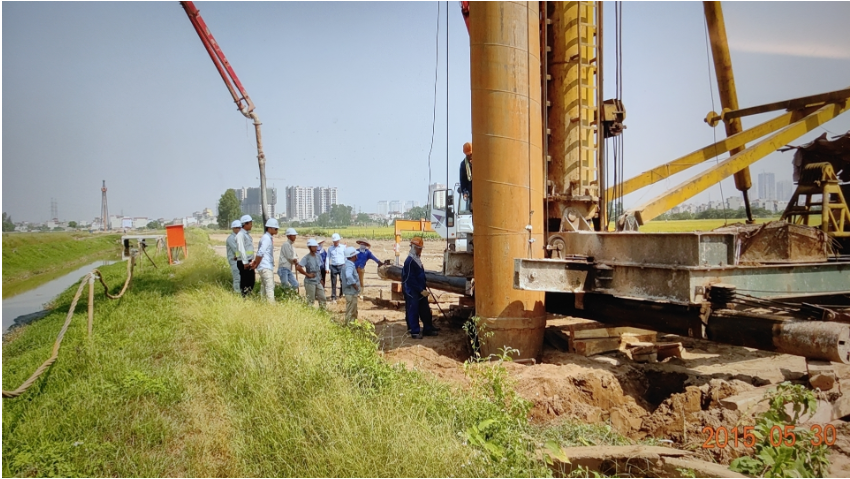
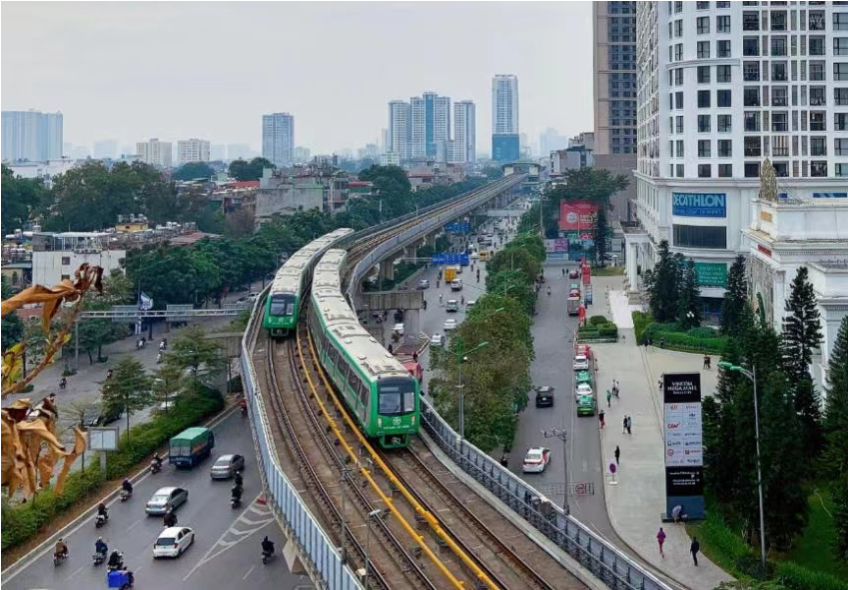
The first urban light rail project in Vietnam
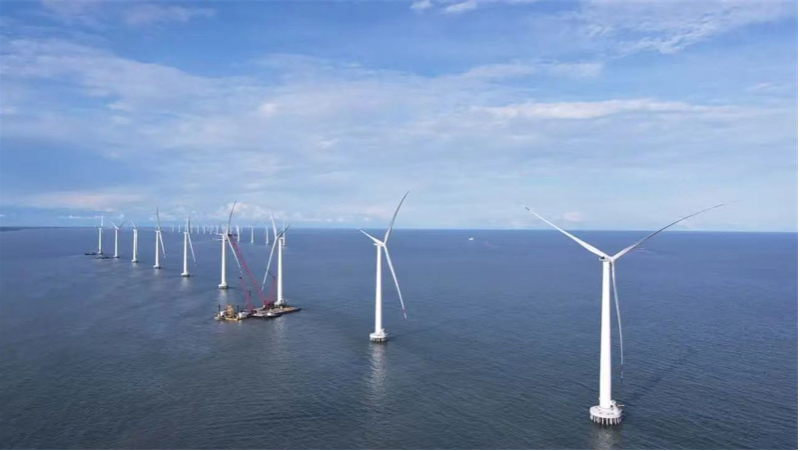
Offshore wind farm in Ca Mau, Vietnam.
In Egypt, the joint scientific research achievement obtained through the project led by Chongqing University, the "intelligent evaluation and optimization platform for operation reliability of high-proportion renewable energy power system" has been used to serve the China's energy development strategy, the Belt and Road Initiative and the Egypt's "Vision 2030", providing technical support for realizing the common goal of safe and reliable operation of high-proportion renewable energy power systems in China and Egypt and even in the world.
In Saudi Arabia, the Cross-scale Porous Materials Research Center of Chongqing University led by the research teams of Prof. Zhang Daliang and Prof. Liu Lingmei, has carried out close scientific research cooperation with King Abdullah University of Science & Technology (KAUST) in Saudi Arabia, focusing on developing new electron microscope technology and using this technology to analyze the spatial structure and physical and chemical properties of complex porous materials. In July 2023, KAUST, Zhejiang University of Technology and Chongqing University were successfully approved to conduct the Major Project of "Intergovernmental Cooperation on International Science, Technology and Innovation" under the National Key Research and Development Program of China---"China-Saudi Arabia Joint Laboratory for Microscale Structural Engineering of Advanced Materials" project.
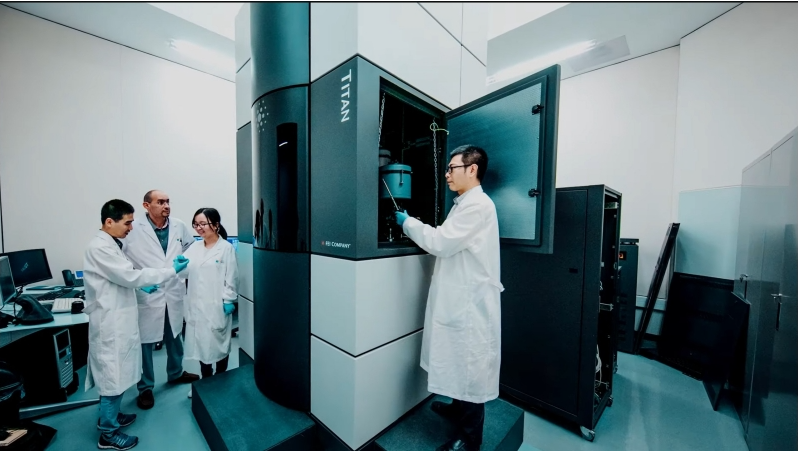
Joint laboratory for microscale structural engineering of advanced materials.
In Thailand, Prof. Liao Qiang from the School of Energy and Power Engineering of Chongqing University took the lead in cooperating with the research teams of Prof. Reungsang from Khon Kaen University, Dr. O-Thong from Thaksin University and Dr. Kongjan from Prince of Songkla University. Combined with the research foundation and advantages of China and Thailand, they jointly conducted the research on the system integration of microalgae biofuel by coupling solar hydrothermal hydrolysis and biochemical transformation from 2015 to 2020. Overcoming the problem that the hydrothermal hydrolysis rate and products of microalgae slurry with variable physical properties did not match the subsequent anaerobic fermentation environment, they built a system for preparing biofuel by coupling microalgae hydrothermal pretreatment with anaerobic fermentation, and realized the production of algae-based clean biofuel driven by solar energy.
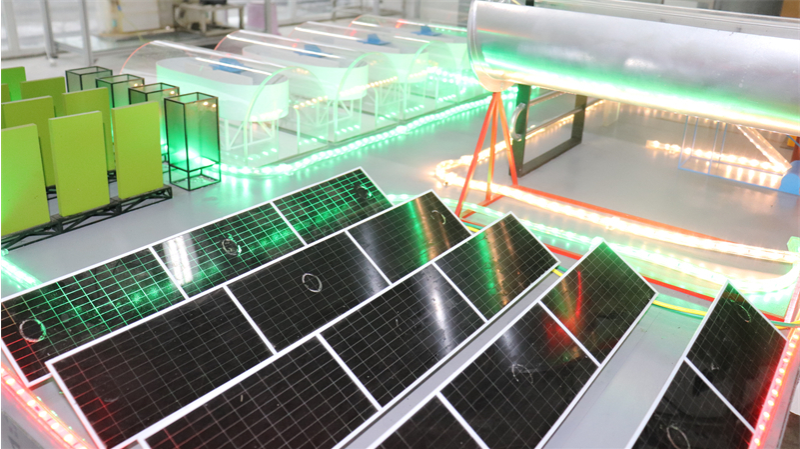
System for preparing biofuel by coupling microalgae hydrothermal pretreatment and anaerobic fermentation
Looking back on this decade, as early as 2014, under the leadership of Zhou Xuhong, an academician of Chinese Academy of Engineering and former President of Chongqing University and Prof. Bai Yongtao, Chongqing University started high-level scientific research cooperation with Venezuela, Chile, Turkey, Burundi and other countries participating in the Belt and Road Initiative, and achieved innovative results with international influence---steel structure fatigue life prediction algorithm and repetitive pulse laser strengthening system. Focusing on the fatigue damage of steel structure in the extreme environment in the future, this cooperation achievement has solved the key bottleneck problems such as macro-fatigue damage mechanics theory of steel structure and its efficient algorithm (more than 90 times higher than the traditional algorithm), crack initiation location, high-low cycle fatigue model establishment and non-additive fatigue performance regulation and improvement.
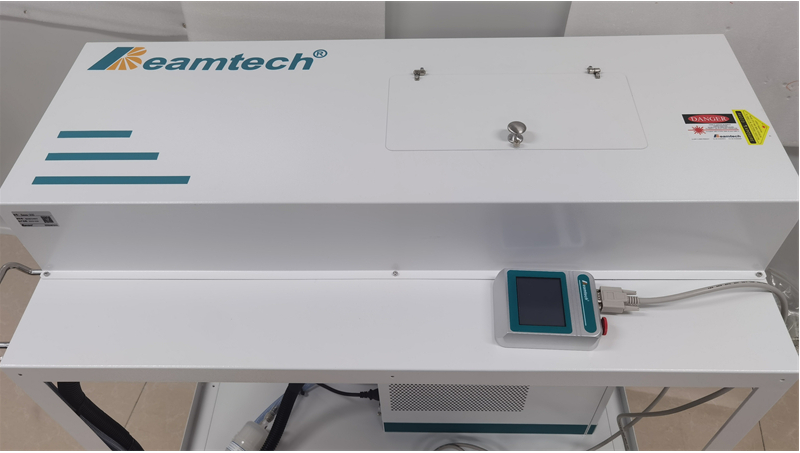
Steel structure fatigue life prediction algorithm and repetitive pulse laser strengthening system.
On the morning of October 27 this year, Liyang Smart City Research Institute of Chongqing University signed a memorandum with Gdansk University of Technology in Poland. According to the memorandum of cooperation, the two sides will jointly promote the establishment of Sino-Polish Research Center for Advanced Waste Water Treatment and Resource Recovery (SPRC-AWTR) to conduct cooperative research on the development and innovation of waste water treatment and resource recovery technology and the practical application of technical equipment achievements.
According to the report of the Institute of Scientific Research and Development, Chongqing University, this Conference is not only a staged review of Chongqing University's response to the Belt and Road Initiative, but also a preface for the future development. In the next stage, based on the mission of strengthening education, Chongqing University will make a more solid contribution to promoting the joint building of the "Belt and Road" into a new stage of high-quality development.
After ten years of development, Chongqing University will continue the right path for greater achievements. It will take up its mission, strive to forge ahead and always practice the building of the "Belt and Road Initiative". Taking this Roundtable Forum: Paradigm Shift in Research and Development in the Digital Era as an opportunity, it will actively promote exchanges and cooperation between universities and scientific research institutions around the world, carry out international scientific and technological innovation cooperation projects, advance inter-school cooperation with countries involved in the Belt and Road Initiative to achieve a new leap, and help the high-quality building of the "Belt and Road Initiative" present the glory of the times.
